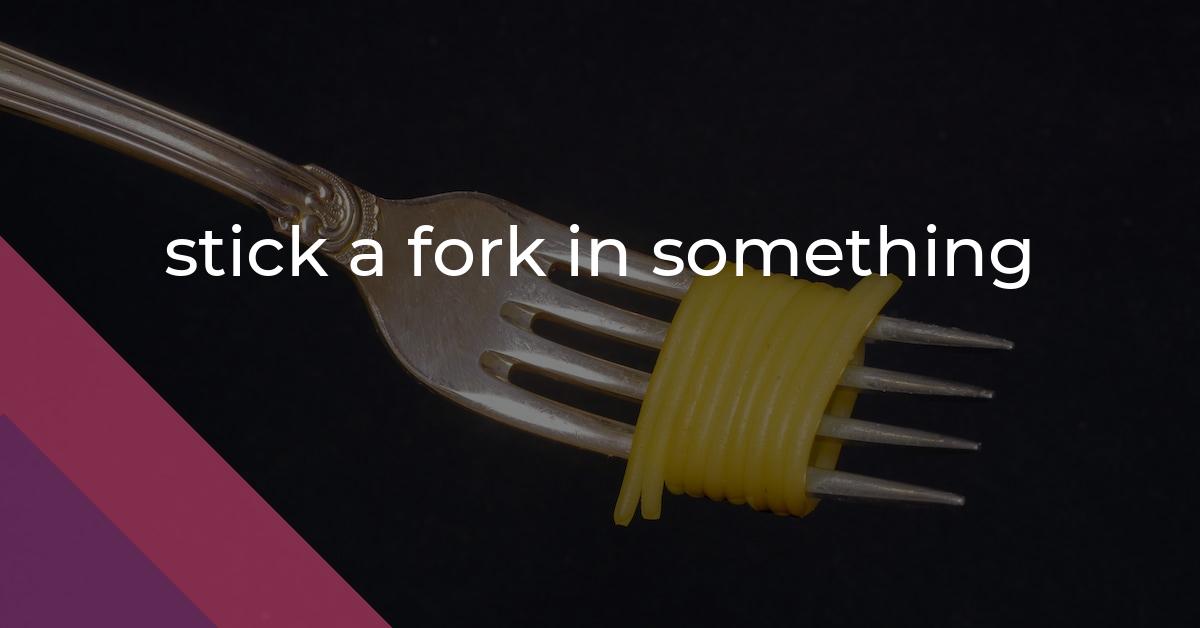stick a fork in something: Idiom Meaning and Origin
What does ‘stick a fork in something’ mean?
The idiom "stick a fork in something" means that something is finished or completed, and there is no need to continue with it.

Idiom Explorer
The idiom "the sun sets on something" means that something is coming to an end or reaching its completion.
The idiom "the end of one's rope" means to reach the limits of one's patience, stamina, or resources, with no more options or solutions available.
The idiom "the box they're going to bury it in" refers to the final resting place or ultimate outcome of something. It implies that the situation or matter will be closed or resolved completely.
The idiom "that's your lot" means that something has come to an end or there is nothing more to be expected or offered. It can be used to express that there is no more of something or that there is no further opportunity or possibility.
The idiom 'that's that' is used to conclude a discussion or resolve a situation, implying that nothing more needs to be said or done about it. It signifies finality and closure.
The idiom "that's done it" is used to indicate that something has reached a critical or irreversible point, often referring to a negative outcome or consequence. It implies that a particular action or event has brought about a significant change that cannot be undone.
The idiom "that's all she wrote" means that something is finished or ended, often with a negative or disappointing outcome. It suggests that there is nothing else to be said or done about a situation.
The idiom "switch off" means to lose interest or become disengaged from something mentally or emotionally, often resulting in a lack of attention or focus.
The idiom "swear off" means to make a firm decision to stop doing or using something, typically because it is considered unhealthy or undesirable.
Hidden Tale
"Stick a fork in something" is a common phrase used in informal, everyday American English. It originated from culinary practices and the use of a fork to determine the readiness of food, particularly meat. This idiom is predominantly used in American English and may not be as widely recognized in other English-speaking regions.
The figurative meaning of this idiom suggests that something is finished, complete, or beyond repair. It implies that further action or intervention is unnecessary or futile. It conveys a sense of finality, similar to puncturing an item with a fork, rendering it inedible or irreparable.
One theory about the origin of this idiom proposes that it evolved from using a fork as a kitchen tool to test the tenderness of cooked meat. By sticking a fork into the meat, cooks can determine if it is cooked to their desired doneness. If the fork easily pierces the meat, it is considered "done" or ready to be served. This act of sticking a fork in the meat symbolizes reaching a point of completion or readiness.
Another theory suggests that the idiom may have emerged from the idea of sticking a fork into food to claim or mark it as one's own. By asserting ownership over the food, one effectively declares it as finished or no longer available for others to consume. This sentiment of finality and completion is then extended to other contexts, where sticking a fork in something symbolizes its definitiveness or irreversibility.
Regardless of its precise origin, this idiom is widely understood by native speakers and has become firmly ingrained in the English language. It can be applied to various situations, from literal scenarios involving culinary endeavors to metaphorical situations like declaring the end of an argument or the conclusion of a project.
One related idiom that shares a similar meaning is "have done with." This idiom also signifies the completion or finishing of something. It implies a desire or decision to put an end to a situation or activity. Just like sticking a fork in something, using the idiom "have done with" suggests a sense of finality and the intention to move on or move forward.
Another related idiom is "put an end to." This idiom also conveys the idea of bringing something to a close or finishing it. It implies the act of terminating or stopping a particular situation or activity. Similar to sticking a fork in something, using the idiom "put an end to" emphasizes the finality of the action taken to conclude or resolve a matter.
A third related idiom is "draw stumps." This idiom comes from the game of cricket and specifically refers to the act of removing the stumps, or wooden stakes, that mark the wickets. When a team decides to "draw stumps," it means they are ending play for the day or the match. This idiom is used more in British English and Australian English, highlighting the regional variations in idiomatic expressions.
These related idioms reinforce the notion of finality and the desire to bring something to a close. They reflect the human tendency to seek resolution, completion, or the end of a particular situation or task. By using idiomatic expressions like "stick a fork in something," "have done with," "put an end to," and "draw stumps," we can communicate these ideas effectively and convey a sense of decisiveness and closure in our language.
Example usage
Examples of how the idiom stick a fork in something can be used in a sentence:
- You can stick a fork in the turkey to see if it's done.
- After months of negotiations, it's time to stick a fork in the deal and move on.
- The team was exhausted after playing three consecutive games, so the coach decided to stick a fork in their practice session.
More "Cooking" idioms



